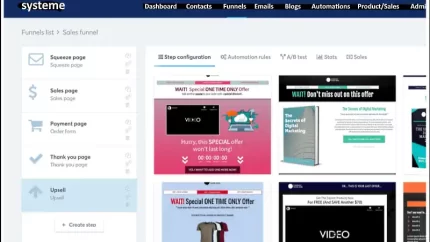Are you a small business owner looking for the most effective way to market your products or services? If so, it’s important that you understand how to determine which internet marketing channels are right for your business.

In today’s digital age, understanding what works best for your particular needs can be overwhelming. Don’t worry – with the help of this article, you’ll learn the basics and gain insight into what strategies are likely to give you the biggest return on investment.
Gone are the days when traditional print media was enough to get word out about a product or service. Nowadays, there is an enormous range of online marketing options available; from organic search engine optimization (SEO) campaigns to content creation through social media platforms like Twitter, Instagram, and Facebook. It can be difficult to decide which approach will yield the best results without some research and experimentation on your part.
By leveraging both paid and unpaid techniques in tandem, though, you can ensure maximum visibility and reach potential customers more efficiently than ever before. With this guide as a starting point, you’ll have all the information necessary to make informed decisions regarding which internet marketing channel(s) work best for your specific needs. Keep reading to learn more!
Assessing Company Goals
Exploring the world of internet marketing can seem like an never-ending task. It’s an absolute cornucopia of options that can leave even the savviest business owners feeling overwhelmed. But, it doesn’t have to be so intimidating! Before you jump into any online campaigns, take some time to evaluate your company goals and objectives with a thorough goal setting assessment.
Start by asking yourself: what is my ultimate desired result? Evaluating your current objectives and analyzing them for effectiveness will help determine which channels are right for your business needs. Take into consideration the resources available at this moment in terms of budget and staff. Think about your target audience – who do you want to reach? How much effort are you willing to put forth? Once these questions have been answered, you’ll have more clarity on how best to utilize various digital marketing strategies.
Types Of Digital Channels
When considering digital channels for your business, there are many options to consider. Social media marketing is one of the most popular and effective methods of increasing brand awareness and engaging with customers online. It can also be used to promote special offers, generate leads, and increase sales.
Search engine optimization (SEO) focuses on improving organic rankings in search results by optimizing content for certain keywords. Content marketing involves creating high-quality content that adds value to a website and drives traffic from other sources such as social media or referral links.
Email marketing allows businesses to create targeted emails campaigns designed to nurture leads through an automated process.
Influencer marketing involves partnering with influential people who have large followings on social media platforms to spread the word about your product or service.

Here’s a short description of 40 possible internet marketing channels:
- Search engine optimization (SEO): Optimizing your website to rank higher in search engine results and drive organic traffic.
- Pay-per-click (PPC) advertising: Running targeted ads on search engines or social media platforms and paying only when users click on your ads.
- Social media marketing (SMM): Promoting your brand, products, or services on various social media platforms to engage with your target audience.
- Social media advertising: Running paid ads on social media platforms like Facebook, Instagram, or Twitter to reach a specific audience segment.
- Email marketing: Sending targeted emails to your subscribers to promote products, share updates, or nurture customer relationships.
- Content marketing: Creating and distributing valuable and relevant content (such as blog posts, videos, or infographics) to attract and engage your target audience.
- Influencer marketing: Collaborating with influential individuals or social media personalities to promote your brand or products to their audience.
- Influencer partnerships and sponsorships: Collaborating with influencers to promote your brand or products through sponsored content or endorsements.
- Affiliate marketing: Creating your own affiliate program and partnering with affiliates who promote your products or services and earn a commission for each sale they generate.
- Affiliate networks and platforms: Joining affiliate networks or platforms to expand your reach by recruiting affiliates who promote your products or services for a commission.
- Video marketing: Using videos to convey your brand message, demonstrate products, or engage with your audience on platforms like YouTube or social media.
- Display advertising: Placing graphical or banner ads on websites or mobile apps to increase brand visibility and drive traffic.
- Mobile marketing: Tailoring your marketing efforts to reach and engage with users on mobile devices through apps, SMS, or mobile ads.
- Podcasting: Creating and publishing audio content in the form of podcasts to reach and engage with your target audience.
- Podcast advertising: Promoting your brand or products through sponsorships or advertisements on other’s podcasts to reach a targeted audience.
- Native advertising: Creating content that matches the form and function of the platform it appears on, providing a more seamless advertising experience.
- Online PR: Generating media coverage, press releases, or engaging with online publications and influencers to enhance brand visibility and reputation.
- Retargeting/remarketing: Displaying targeted ads to users who have previously visited your website or engaged with your brand online.
- Blogging and guest blogging: Creating and publishing blog content on your own website or contributing articles to other industry-related blogs to increase exposure and establish expertise.
- Online partnerships and collaborations: Collaborating with other businesses or influencers to co-create content, cross-promote, or leverage each other’s audiences.
- Webinars and online events: Hosting online presentations, webinars, or virtual events to educate, engage, or generate leads for your business.
- Online directories and listings: Listing your business in relevant online directories or listings to increase visibility and improve local search rankings.
- Social media contests and giveaways: Running contests or giveaways on social media platforms to encourage engagement, increase brand awareness, and attract new followers or customers.
- Live streaming and webcasts: Broadcasting live video content on platforms like social media, websites, or dedicated streaming platforms to engage with your audience in real-time.
- Online forums and communities: Participating in online forums and communities relevant to your industry or target audience to build relationships, provide value, and establish your expertise.
- Online reviews and ratings: Encouraging customers to leave reviews and ratings of your products or services on review platforms or your website to build social proof and credibility.
- Online marketplaces: Selling products or services on popular online marketplaces like Amazon, eBay, or Etsy to reach a wider audience and tap into existing customer bases.
- Influencer takeovers on social media platforms: Allowing influencers to temporarily take control of your social media accounts to create content, engage with their followers, and promote your brand.
- Online courses and educational content: Creating and offering online courses, tutorials, or educational resources related to your industry to establish authority and attract leads.
- Guest posting on industry blogs: Writing and publishing articles or blog posts on other industry-related blogs to reach new audiences, build backlinks, and enhance your brand visibility.
- Web push notifications: Sending targeted and personalized notifications to website visitors who have opted in, providing updates, promotions, or important information.
- SMS marketing: Sending text messages to mobile users who have subscribed to receive updates or promotions, offering a direct and immediate way to reach customers.
- Influencer shout-outs on social media: Collaborating with influencers who mention or promote your brand in their social media posts to reach their followers and increase brand visibility.
- Web analytics and data tracking: Utilizing tools and platforms to collect and analyze data about website traffic, user behavior, and marketing performance to make data-driven decisions.
- Viral marketing campaigns: Creating and launching marketing campaigns with the goal of generating significant buzz, shares, and exposure through captivating and shareable content.
- Online surveys and customer feedback: Collecting feedback and insights from customers through online surveys or feedback forms to better understand their needs and improve your products or services.
- Online advertising networks: Displaying ads on online advertising networks such as Google AdSense or Bing Ads to reach a broader audience and increase brand exposure.
- Online PR through industry publications and blogs: Reaching out to industry publications and influential blogs to secure coverage or guest posts that increase brand visibility and credibility.
- Podcast sponsorships: Collaborating with podcast hosts or networks to sponsor episodes or segments, allowing you to reach their audience and promote your brand or products.
- Online contests and sweepstakes: Running promotional campaigns where users can participate in contests or sweepstakes online, often by providing their contact information or engaging with your brand, to increase brand awareness and gather leads.
These are just a few examples of the many internet marketing channels available to businesses. The choice of channels depends on the target audience, marketing goals, and the nature of the business. It’s important to analyze and select the channels that align best with your marketing strategy and objectives.
All these strategies should be evaluated carefully when determining which internet channels will best suit your needs.
Evaluating Potential Channels
Now that you know several types of digital channels available, it’s time to evaluate which ones are right for your business. Evaluating potential channels involves engaging in marketing analysis and competitive research while also considering cost-benefit factors. Here is a step-by-step approach to channel selection:
- Research the online advertising options of competitors in your industry.
- Make a list of the most relevant channels for reaching your target audience.
- Analyze user data from past campaigns to determine which channels had the highest ROI or lowest CPA (cost per acquisition).
Once you have an understanding of what has worked well for other companies in your field, consider how this information can inform your own decisions about channel selection. Also look at any trends within the market that could influence where customers spend their money – such as changes in technology or consumer behavior over time. Finally, keep an eye on emerging technologies so you don’t miss out on new opportunities for growth and engagement with customers.
Here are some examples of marketing channels that could be well-suited for specific types of businesses:
- Beauty or Decorating Site:
- Pinterest: Utilizing visually-oriented content to showcase products, tutorials, and inspirations, as Pinterest is known for its strong visual focus.
- Instagram: Sharing high-quality images and videos to showcase products, demonstrate makeup techniques, or showcase home decor inspiration.
- B2B Consulting Firm:
- LinkedIn: Utilizing targeted advertising and engaging with professional groups to reach decision-makers and establish thought leadership within the industry.
- Content Marketing: Creating informative blog posts, whitepapers, and case studies to provide valuable insights and attract potential clients.
- Food or Recipe Blog:
- YouTube: Creating engaging cooking tutorials, recipe demonstrations, or food-related content to reach a wide audience and build a loyal subscriber base.
- Instagram: Sharing visually appealing food photos, recipes, and behind-the-scenes content to attract food enthusiasts and engage with a food-loving community.
- Fitness or Wellness Brand:
- Instagram: Sharing inspiring fitness images, workout videos, and tips to engage with fitness enthusiasts and build an active community.
- Email Marketing: Sending regular newsletters with fitness tips, exclusive offers, and updates to nurture customer relationships and encourage repeat business.
- E-commerce Fashion Store:
- Instagram: Showcasing fashion products through high-quality images, user-generated content, and influencer collaborations to appeal to fashion-conscious consumers.
- Facebook Ads: Running targeted ads to reach specific demographics and retargeting ads to remind potential customers of items they have shown interest in.
Remember that these examples are general suggestions, and the most effective marketing channels can vary depending on various factors, including your specific target audience, industry, and marketing goals. It’s essential to conduct market research and analyze your customer base to identify the channels that align best with your business and your customers’ preferences.
Understanding Your Audience
The first step to finding the right internet marketing channels for your business is understanding your audience. Knowing who your consumers are, and what motivates them to purchase from you, provides insight that can be invaluable when making decisions about where and how to advertise.
Crafting buyer personas – detailed descriptions of the characteristics of each target-audience segment – is a great way to help clarify who you’re trying to reach. To ensure accuracy in these profiles, use demographic research within relevant market segments to get an accurate portrait of their needs and wants. Through audience segmentation, companies can discover which methods will draw attention from the people they wish to serve.

By taking the time to learn more about one’s customers, businesses stand a much better chance at navigating the digital landscape successfully. With this knowledge in hand, entrepreneurs can create campaigns tailored specifically for those audiences most likely to take advantage of their offerings. This helps eliminate any guesswork as it relates to channel selection and leads directly into creating effective messaging with high conversion potentials.
Developing A Strategy
Once you understand your audience and their needs, it’s time to determine which internet marketing channels are right for your business. To get the best return on investment (ROI) from your digital marketing strategy, you need a comprehensive plan that outlines all of your goals and objectives.
| Objective | Channel | Marketing Plan |
|---|---|---|
| Increase brand awareness with target customers | Social media campaigns | Develop content calendar & budget |
| Drive online sales conversions through organic search traffic | Search engine optimization (SEO) | Research keywords & optimize website content |
| Generate leads by capturing email addresses | Paid advertising campaigns & remarketing ads | Identify ideal customer profiles & create targeted ads |
Creating an effective digital marketing strategy requires extensive research so that you can identify the most appropriate channels and develop a marketing plan tailored to your specific business needs. It also involves evaluating existing strategies used by competitors in order to gain insights into how they reach out to their target audiences. With this information in hand, you’ll be better equipped to tailor your own approach and maximize ROI from each channel.
To ensure success, make sure to set realistic goals and clearly define what success looks like for each objective. Have measurable KPIs in place so that you can track progress against those metrics over time. Additionally, regularly review data from analytics platforms such as Google Analytics or Facebook Insights to measure performance and inform future decisions about strategies or tactics that may need adjusting. By investing the time upfront to build an effective marketing plan, you’ll be able to reap greater rewards down the line.
Frequently Asked Questions
What Are The Most Cost-Effective Internet Marketing Channels?
At the start of your journey, it can be difficult to navigate through the many options available when it comes to internet marketing. To ensure that you get off on the right foot, it is important to understand which channels are most cost-effective for your business.
Social media marketing, SEO optimization, content marketing, pay-per-click and email marketing are just some of the many methods businesses use to reach potential customers online. Each method has its own set of advantages and disadvantages as well as associated costs.
For instance, social media requires a significant investment in time, but offers high visibility and engagement with audiences; whereas SEO optimization can take longer to see results but typically yields higher long term ROI. Content marketing provides an opportunity to build trust with potential buyers by providing valuable information at no additional cost beyond labor hours; however, pay-per-click campaigns offer fast results without requiring too much effort or resources. Finally, email marketing allows companies to stay connected with existing customers while also reaching out to new ones at minimal expense.
Choosing between these various options depends heavily on budget constraints and desired outcomes — do you want more leads? More followers? Higher clickthrough rates? Ultimately, understanding which combination of strategies best suits your goals will help ensure that you’re making smart investments and getting maximum return from each channel.
How Do I Measure The Success Of My Internet Marketing Campaigns?
When it comes to measuring success for internet marketing campaigns, there are several important factors to consider. First and foremost is understanding the performance of each campaign. This can be done by analyzing how effective each channel has been in terms of reaching the target audience, driving engagement and conversions, as well as overall ROI (return on investment). Additionally, tracking key marketing metrics such as website traffic, conversion rates, customer lifetime value, and more will give you a better picture of what’s working and what isn’t.
Another way to measure success is through analytics data. By looking at this data over time, you can gain insights into which channels have been most successful in generating leads or sales for your business. You can also compare different campaigns side-by-side to see which ones are getting better results than others. With these insights, you’ll be able to make informed decisions about where best to invest your resources when launching new campaigns or optimizing existing ones.
By taking all of these factors into consideration when evaluating your internet marketing campaigns – from performance metrics and analytics data – you’ll have a clear view of which strategies work best for your business so that you can adjust accordingly and maximize return on investment.
What Level Of Expertise Do I Need To Run My Own Internet Marketing Campaigns?
When it comes to running your own internet marketing campaigns, the level of expertise required can vary. Whether you are looking for a basic understanding of online marketing skills or need more in-depth digital marketing knowledge, there are several areas where proficiency is needed. From web marketing proficiency and social media marketing proficiency to search engine optimization (SEO) strategies and content creation tactics, having an overall understanding of all aspects of internet marketing is essential.
To ensure successful results from your efforts, it’s important to have a good grasp on each area that contributes to internet marketing success. This means taking the time to learn about SEO best practices, crafting compelling copy and visuals for email campaigns, optimizing website pages for organic search traffic, and staying up-to-date with new trends in digital advertising. Additionally, familiarizing yourself with analytics tools such as Google Analytics will help you measure the success of your campaigns and make informed decisions about changes that need to be made along the way.

Although having some degree of expertise in various areas of internet marketing is necessary for running effective campaigns, don’t let that intimidate you from getting started. There are plenty of resources available online – from free tutorials to comprehensive courses – so no matter what skill set you possess now, there are ways you can equip yourself with the knowledge needed to build a successful campaign.
Are There Any Free Or Low-Cost Internet Marketing Tools Available?
When it comes to internet marketing, there are a number of tools available for businesses. Many of these tools are free or low-cost and can provide an affordable way to launch campaigns and reach customers online. In this article, we will discuss the availability of free or low-cost internet marketing tools that businesses can use as part of their budget.
There is no shortage of reliable, cost-effective internet marketing tools out there. Free options include social media platforms such as Facebook, Twitter, Instagram, Pinterest, LinkedIn and YouTube; content management systems like WordPress; email marketing providers including Aweber; web analytics programs like Google Analytics; search engine optimization (SEO) software solutions such as Moz Pro; and advertising networks like AdWords and Bing Ads. All of these tools allow you to create effective campaigns with minimal or even no upfront investment.
Another option for businesses on a tight budget is opting for inexpensive internet marketing services from third-party companies that specialize in creating digital strategies tailored to your needs. Such services may include setting up pay-per-click campaigns, optimizing websites for better visibility in search results pages (SERPs), conducting keyword research to determine potential topics that would benefit your business’s presence online, managing social media accounts across multiple channels, implementing link building tactics, etc. With so many different avenues available when it comes to utilizing digital marketing methods within a restricted budget range, small businesses should have no trouble finding the right option(s).
Conclusion
To sum up, it is important to choose the right internet marketing channels for your business. Choosing the wrong ones can be a costly mistake and have negative impacts on your bottom line. With the right strategy in place, you can leverage these cost-effective tools to reach new customers and grow your business.
It’s all about understanding where your target audience hangs out online and which platforms they are most likely to use when searching for products or services like yours. This requires some research – but once you’ve identified the best channels for reaching potential customers, you’ll need to measure their effectiveness through analytics so that you can adjust as needed. I suggest staying current with trends and changes in the digital landscape to ensure you’re making the best decisions for your company.
Overall, taking advantage of available resources and being mindful of how each channel works will help optimize your return on investment from internet marketing campaigns and secure greater success for your business!

